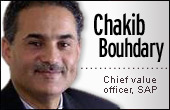Seeing into the future with IT

 |
Chakib Bouhdary, SAP's chief value officer, spends much of his time talking to CEOs. He says information is king today, more so than ever.
Bouhdary spoke to ZDNet Asia about the impact the downturn is making on CEOs and their technology choices in business today.
Q: What "value" are CEOs looking for in this downturn?
Bouhdary: We just finished some research on what the CEOs want. This downturn is unique: you don't get one like this every 10 years, but one that occurs every 50 years because it's such a long cycle.
If you look at the history of downturns, the economy tends to take two-and-a-half times to go back to the way it was before. So if you look at the economy going down in the last 18 months, you can assume that it'll take another three years to resume.
This is important because in the past, when there was a bad economy, CEOs just had to make some changes: reduce production, fire people. When the economy came back, they could just push the production back up and off you go.
That isn't happening this time. Now, all the problems built into the business will show up. If you have lack of visibility into your finances it'll show up. If you've made some bad acquisitions, it'll show up, because the margin for error is so much smaller.
| Companies [in Asia] have to be agile, because opportunities open up fast and they close fast, too. |
So this is forcing CEOs to ask themselves how they can structurally reduce cost.
An easy way to do that is to put their business functions like HR, finance and IT into shared services.
Q: So you're advocating a more permanent change?
Yes, this is not cutting cost by trimming some corners.
If you can reduce your SGNA (sales and general administration) cost by 30-50 percent, that could put another 3-4 percent on your bottom line. That will give a company a massive comparative advantage on pricing.
More importantly, if you make an acquisition or go to a new market, shared services will make it a lot easier to integrate new acquisition costs into the infrastructure.
Companies are also rethinking their position on the value chain. For example, [in the communications industry], it's content making the most money, not handhelds.
So you will find, after this downturn, some companies will not be recognizable. Telcos will be content distributors, not network companies, and will provide TV programs and music.
Q: What are the technologies that are changing business?
In today's business, you have to know your customer, their behavior. Today's business is analytics-driven.
You're going to see a massive need for managing structured and unstructured data, to deal with the explosion of data.
You need a technology to analyze a terabyte of data in an instant. We call that analytics at the speed of mind.
What happens today is CEOs ask questions and get someone to research it. But when the answer returns, the CEO's moved on from that topic.
Q: Do CEOs want to get so close to raw data?
No, you want the raw data to disappear. They want to see information, to see the future.
I don't think the CEOs care about the way the information is delivered, but that they can trust it and have it in an easily-consumable way.
Q: What do Asian CEOs want? Are they different from CEOs in the West?
The world economy has shifted, with countries like China and Brazil becoming powerhouses.
In China, for example, the government has a huge impact on the direction each industry goes toward. These things you don't see so often in the West, where decisions are made at a micro level.
The actions for change in these new economies are much faster. So companies have to be agile, because opportunities open up fast and they close fast, too.
Q: How different are the views of the CEOs of growing companies in Asia?
Companies used to be very focused on being the best in their country's industry. Today, the small companies want to be benchmarked against the big companies globally.
There is an aspiration to be the best in the world because they know they're not just competing with other Chinese companies, but the rest in the world.
They are willing to take more risks. People spend too much time analyzing in the U.S. CEOs in China just move.